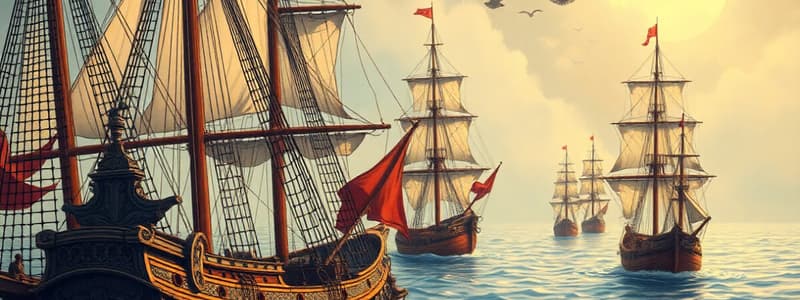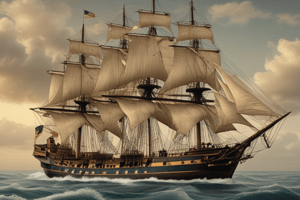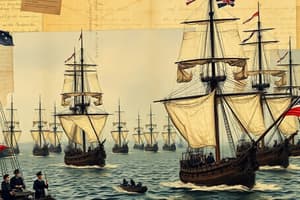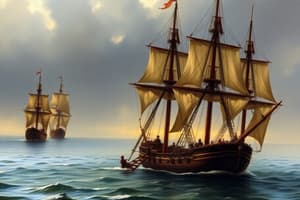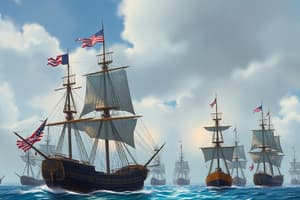Podcast
Questions and Answers
What type of documents are included in the volumes discussed?
What type of documents are included in the volumes discussed?
- Only military orders and reports
- Articles written by historians
- Diaries, letters, and ship logs (correct)
- Official government reports only
Which president's foreword is included in the first volume of the collection?
Which president's foreword is included in the first volume of the collection?
- John F. Kennedy (correct)
- Lyndon Johnson
- Richard Nixon
- Gerald Ford
Who succeeded Dr. William Dudley as editor of the series?
Who succeeded Dr. William Dudley as editor of the series?
- Dr. William J. Morgan
- Dr. Michael J. Crawford (correct)
- William B. Clark
- Gerald Ford
Which volume was produced by the NHHC in 2019?
Which volume was produced by the NHHC in 2019?
What perspective does the collection NOT represent?
What perspective does the collection NOT represent?
What was established by the Continental Congress on 13 October 1775?
What was established by the Continental Congress on 13 October 1775?
Which battle is noted as one of the longest and bloodiest during the American Revolution?
Which battle is noted as one of the longest and bloodiest during the American Revolution?
What issue did American naval commanders often face during the Revolutionary War?
What issue did American naval commanders often face during the Revolutionary War?
Which ship was captured by John Paul Jones while commanding Ranger?
Which ship was captured by John Paul Jones while commanding Ranger?
How many warships did the colonies have by 1776?
How many warships did the colonies have by 1776?
What role did American privateers play during the naval conflict of the American Revolution?
What role did American privateers play during the naval conflict of the American Revolution?
Who led the fleet that attacked a British colony in the Bahamas on 17 February 1776?
Who led the fleet that attacked a British colony in the Bahamas on 17 February 1776?
What was a significant challenge for the American colonies in building their naval power?
What was a significant challenge for the American colonies in building their naval power?
Which notable ship served under John Paul Jones during the Revolutionary War?
Which notable ship served under John Paul Jones during the Revolutionary War?
Who among the following was not associated with the Continental Navy during its formative years?
Who among the following was not associated with the Continental Navy during its formative years?
What significant resolution did the Continental Congress pass on November 25, 1775?
What significant resolution did the Continental Congress pass on November 25, 1775?
Which person is recognized as one of the first commissioned officers in the Continental Navy?
Which person is recognized as one of the first commissioned officers in the Continental Navy?
What was a notable artifact presented as part of the naval history during the American Revolution?
What was a notable artifact presented as part of the naval history during the American Revolution?
What strategic advantage did Britain maintain during 1779 and 1780?
What strategic advantage did Britain maintain during 1779 and 1780?
Who commanded the French fleet that landed in Newport, Rhode Island?
Who commanded the French fleet that landed in Newport, Rhode Island?
What was the outcome of the Battle of Virginia Capes?
What was the outcome of the Battle of Virginia Capes?
What role did privately armed vessels play during the war?
What role did privately armed vessels play during the war?
What mistake did Admiral Rodney make while in the West Indies?
What mistake did Admiral Rodney make while in the West Indies?
How many British vessels were seized by American ships by the end of the war?
How many British vessels were seized by American ships by the end of the war?
What were the preliminary articles of peace signed on 30 November 1782 related to?
What were the preliminary articles of peace signed on 30 November 1782 related to?
Which battle did Benedict Arnold lead in an attempt to challenge the British naval forces?
Which battle did Benedict Arnold lead in an attempt to challenge the British naval forces?
What was the impact of Benedict Arnold's battles on British naval strategy?
What was the impact of Benedict Arnold's battles on British naval strategy?
What was the significant consequence of the French assistance at the Battle of Yorktown?
What was the significant consequence of the French assistance at the Battle of Yorktown?
What did Britain cede to Spain as part of the Peace of Paris?
What did Britain cede to Spain as part of the Peace of Paris?
How did the entrance of France and Spain into the war change the naval conflict?
How did the entrance of France and Spain into the war change the naval conflict?
Who was the British general defeated at Yorktown?
Who was the British general defeated at Yorktown?
What was a consequence of increasing British marine insurance rates during the war?
What was a consequence of increasing British marine insurance rates during the war?
What challenge did the British face regarding blockading American ports?
What challenge did the British face regarding blockading American ports?
What was the overall impact of American naval actions on British merchants by 1781?
What was the overall impact of American naval actions on British merchants by 1781?
Flashcards
Continental Navy
Continental Navy
The naval force established by the Continental Congress to fight in the American Revolution.
American Privateers
American Privateers
Colonial ships converted into armed vessels to attack British shipping during the American Revolution.
John Paul Jones
John Paul Jones
A notable Continental Navy captain known for his victories against British warships during the American Revolution.
Bonhomme Richard vs. Serapis
Bonhomme Richard vs. Serapis
Signup and view all the flashcards
Continental Navy Successes
Continental Navy Successes
Signup and view all the flashcards
American Revolution Naval Force
American Revolution Naval Force
Signup and view all the flashcards
Naval Importance
Naval Importance
Signup and view all the flashcards
First Amphibious Assault
First Amphibious Assault
Signup and view all the flashcards
Naval History Documents
Naval History Documents
Signup and view all the flashcards
Diverse Voices
Diverse Voices
Signup and view all the flashcards
NHHC's Legacy
NHHC's Legacy
Signup and view all the flashcards
Editors of the Series
Editors of the Series
Signup and view all the flashcards
Volume 13
Volume 13
Signup and view all the flashcards
Privateer Vessels
Privateer Vessels
Signup and view all the flashcards
State Navies
State Navies
Signup and view all the flashcards
Impact of American Naval Actions
Impact of American Naval Actions
Signup and view all the flashcards
Benedict Arnold's Lake Champlain Battles
Benedict Arnold's Lake Champlain Battles
Signup and view all the flashcards
French, Spanish, and Dutch Involvement
French, Spanish, and Dutch Involvement
Signup and view all the flashcards
British Naval Challenges
British Naval Challenges
Signup and view all the flashcards
American Naval Successes
American Naval Successes
Signup and view all the flashcards
Importance of Naval Power
Importance of Naval Power
Signup and view all the flashcards
French Support
French Support
Signup and view all the flashcards
Battle of Virginia Capes
Battle of Virginia Capes
Signup and view all the flashcards
Yorktown Siege
Yorktown Siege
Signup and view all the flashcards
Naval Superiority in the North
Naval Superiority in the North
Signup and view all the flashcards
Gibraltar Siege
Gibraltar Siege
Signup and view all the flashcards
Admiral Rodney's Shift
Admiral Rodney's Shift
Signup and view all the flashcards
French Fleet in Chesapeake
French Fleet in Chesapeake
Signup and view all the flashcards
Peace Treaty Impact
Peace Treaty Impact
Signup and view all the flashcards
John Paul Jones' famous quote
John Paul Jones' famous quote
Signup and view all the flashcards
Resolution of the Continental Congress (1775)
Resolution of the Continental Congress (1775)
Signup and view all the flashcards
Continental Navy Period
Continental Navy Period
Signup and view all the flashcards
What was the Bonhomme Richard?
What was the Bonhomme Richard?
Signup and view all the flashcards
What was the Continental Navy's primary purpose?
What was the Continental Navy's primary purpose?
Signup and view all the flashcards
Study Notes
American Revolution (1775-1783)
- The initial American navy comprised merchant vessels experienced in seafaring and warfare, countered by the powerful British Royal Navy.
- The Continental Congress established the Continental Navy in 1775.
- By 1776, the colonies had 27 warships, compared to the British Royal Navy's roughly 270 warships.
- Colonial naval commanders faced challenges in training and discipline among their sailors and Marines.
- The Continental Navy achieved some victories, notably, John Paul Jones's capturing of British ships.
- American privateers played a significant role, attacking British shipping.
- An estimated 2,000 privately armed vessels, carrying over 18,000 guns and 70,000 men, operated during the war.
- State navies also participated in disrupting British trade.
- American naval forces captured more than 500 British vessels by 1777 and approximately 1,500 by the war's end.
- The British navy's struggles included issues with blockading American ports.
- The British experienced increased insurance costs and greater fear of American and allied invasions.
- Most naval engagements took place on the open sea, with exceptions like Benedict Arnold's battles on Lake Champlain.
- Arnold's efforts delayed the British attack on Fort Ticonderoga and impacted the 1777 Battle of Saratoga.
- The entry of France, Spain, and the Netherlands into the war in 1779-80 significantly altered the naval landscape, stretching British resources.
- Though not highly active, these nations kept British naval forces occupied in Europe, disrupting British plans.
- Despite some French and Spanish dominance in European waters, the British maintained naval superiority along the North American coast.
- The 1781 Battle of the Chesapeake (also known as the Battle of Virginia Capes) prevented British reinforcement or evacuation of Yorktown.
- The French fleet supported the Franco-American army, leading to the decisive defeat of British forces at Yorktown.
- The American victory at Yorktown played a key role in securing independence.
- Preliminary peace agreements were reached in November 1782, with the official Treaty of Paris in September 1783 ending the revolution.
Naval Documents of the American Revolution Series
- The series comprises 13 volumes of authentic documents, letters, and records from the American Revolution.
- The documents offer diverse perspectives, encompassing those of American, British, French, and Spanish participants.
- They include ship logs, muster rolls, orders, official reports, newspaper accounts, and first-hand accounts.
Artifacts
- The National Museum of the U.S. Navy features exhibits on the American Revolution and the Franco-American alliance.
- There are artifacts related to the revolution, including records of notable ships or individuals involved.
Notable American Ships
- Multiple American ships are mentioned, including the Alfred, Bonhomme Richard, and Saratoga.
Notable People
- Key figures like John Barry, Gustavus Conyngham, Esek Hopkins, John Paul Jones, and Lambert Wickes are listed.
Studying That Suits You
Use AI to generate personalized quizzes and flashcards to suit your learning preferences.
